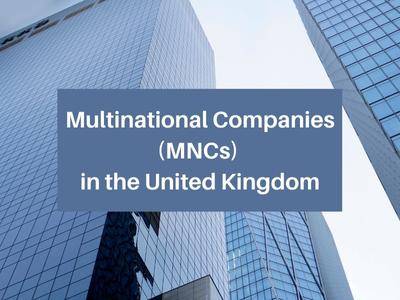Multinational Companies (MNCs) in the United Kingdom

Multinational companies, or MNCs, have been around for centuries and are very much a part of the United Kingdom’s colonial history. As an empire builder, Great Britain controlled the administration of its far-flung colonies by commissioning MNCs to ply its trade routes.
One of the earliest and most notable examples was the East India Company, founded in 1600 by the British. It spearheaded trade and exploration, with trading posts located in other countries. Today, MNCs are global market drivers, expanding worldwide to maintain competitiveness. Setting up a company in the United Kingdom is on-trend with globalisation. It is part of the strategic global alliance of emerging economies that work on an international scale.
Why Is the United Kingdom is Ideal for Multinational Companies?
The United Kingdom remains a preferred destination for multinational companies due to its strong economic foundations, global connectivity, and business-friendly environment.
As a business grows, the need to scale up operations will grow exponentially. The production and supply of goods and services can then take on international dimensions. The United Kingdom’s service sector alone contributes to almost 80% of its gross domestic product (GDP).
While MNCs may exploit labour or deskill some jobs, they do drive economic growth. MNCs also tend to introduce new technologies, create more jobs, and raise.
What Defines a Multinational Company (MNC) In UK?
MNCs are defined as having assets, operations, and facilities in one or more countries other than its home country. The typical MNC has a centralised headquarters that coordinates global operations.
They are huge corporate organisations with massive budgets and thousands of employees. Some of the top MNCs in the United Kingdom include Shell, BP, and Prudential Public Limited Company.
It is important to note that merely having some trade in other countries is insufficient to qualify as an MNC. A corporation must have business operations in two or more countries, other than its home country, to be considered an MNC. Online businesses, for example, should have distribution centres in countries other than the home country.
Types of Multinational Company Structures
Large corporations favour several different models of MNCs, and these include the following:
- The corporation is global and builds on its research and development facilities.
- The corporation is centralised but becomes global to capitalise on economies of scale.
- The strongest presence is in the home country, but the corporation itself is decentralised.
- A corporation that combines all three into a hybridised version known as a transnational corporation. These types of MNCs have headquarters and operations in more than two countries.
What are the benefits of Setting Up an MNC in the UK?
MNCs are on the rise and bring much-needed foreign direct investment (FDI) with them. Most MNCs prefer to have operations based closer to their targeted international markets. Other factors include competitive tax regimes, a flexible wage market, and advanced infrastructure.
As Europe’s gateway, the United Kingdom is ideally suited for MNCs, especially with its strong regulatory framework and incentivised labour market.
How 3E Accounting Supports Multinational Companies
Globalisation has undoubtedly opened the door for multinational companies (MNCs) in the United Kingdom.
If you are ready to take advantage of this opportunity, 3E Accounting is on hand to assist. Along with our international affiliates and partners, 3E Accounting offers par excellence global expertise. Our customisable and innovative business solutions are delivered with impeccable professionalism.
Contact 3E Accounting today to begin your global business ventures.

